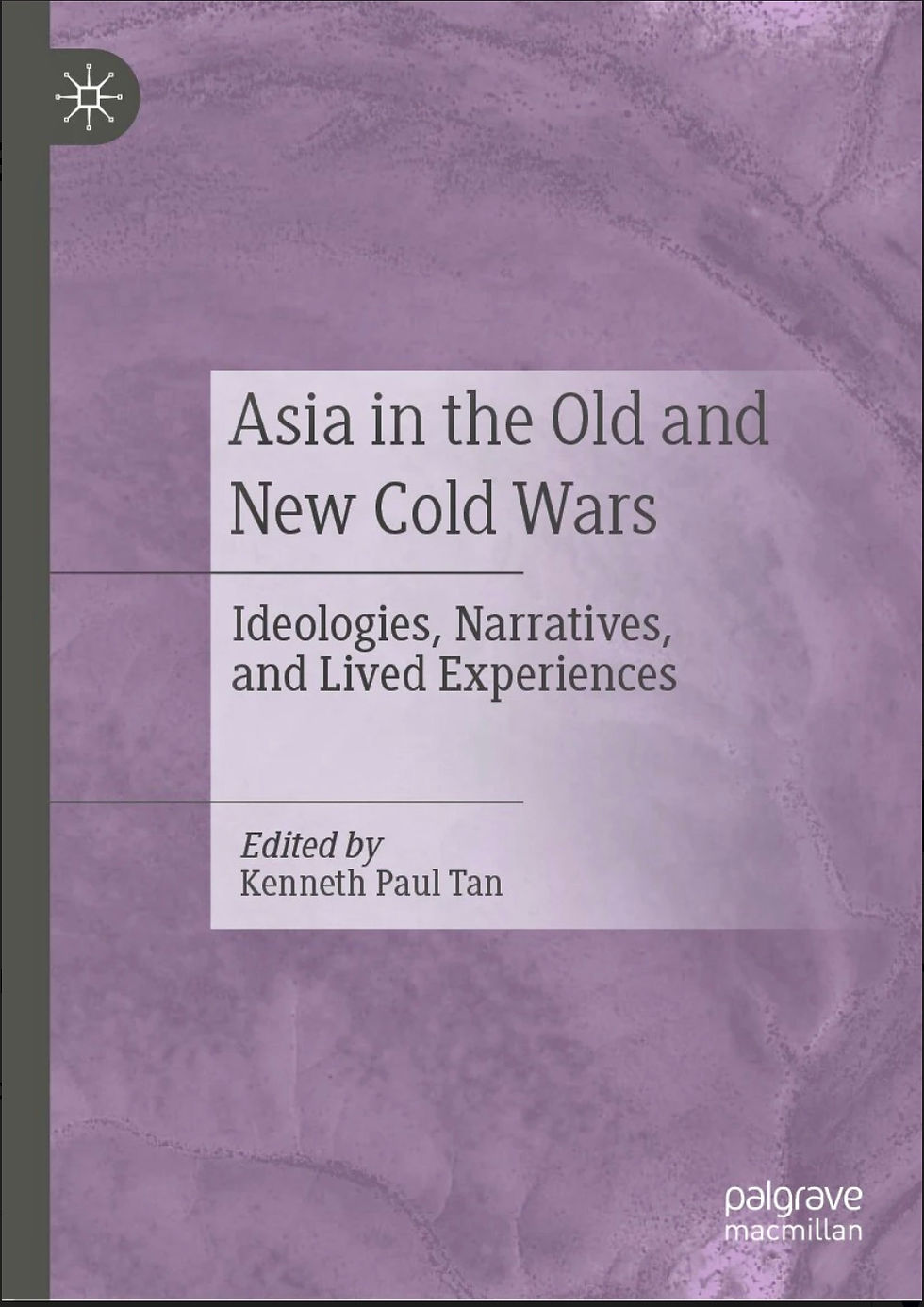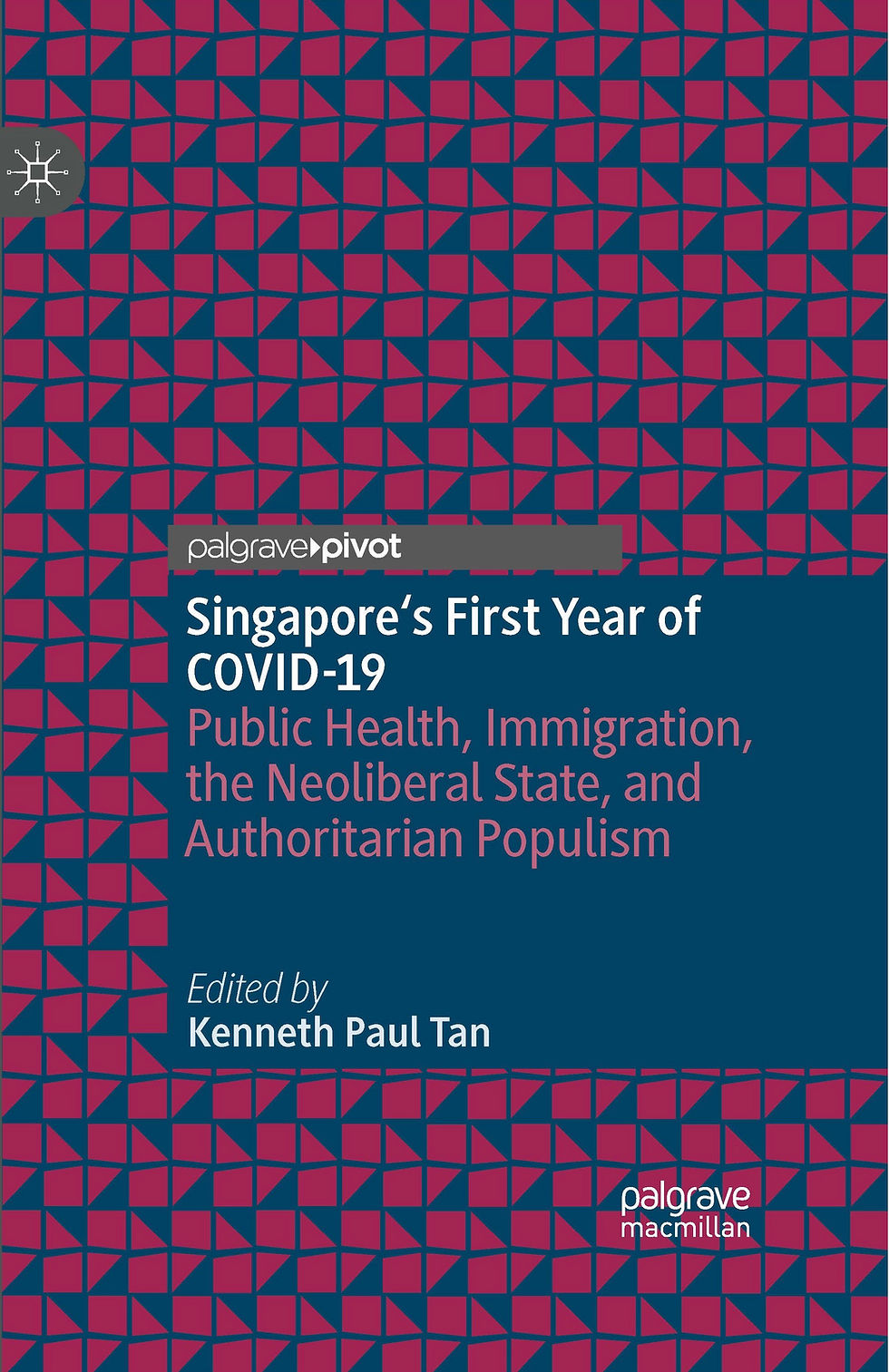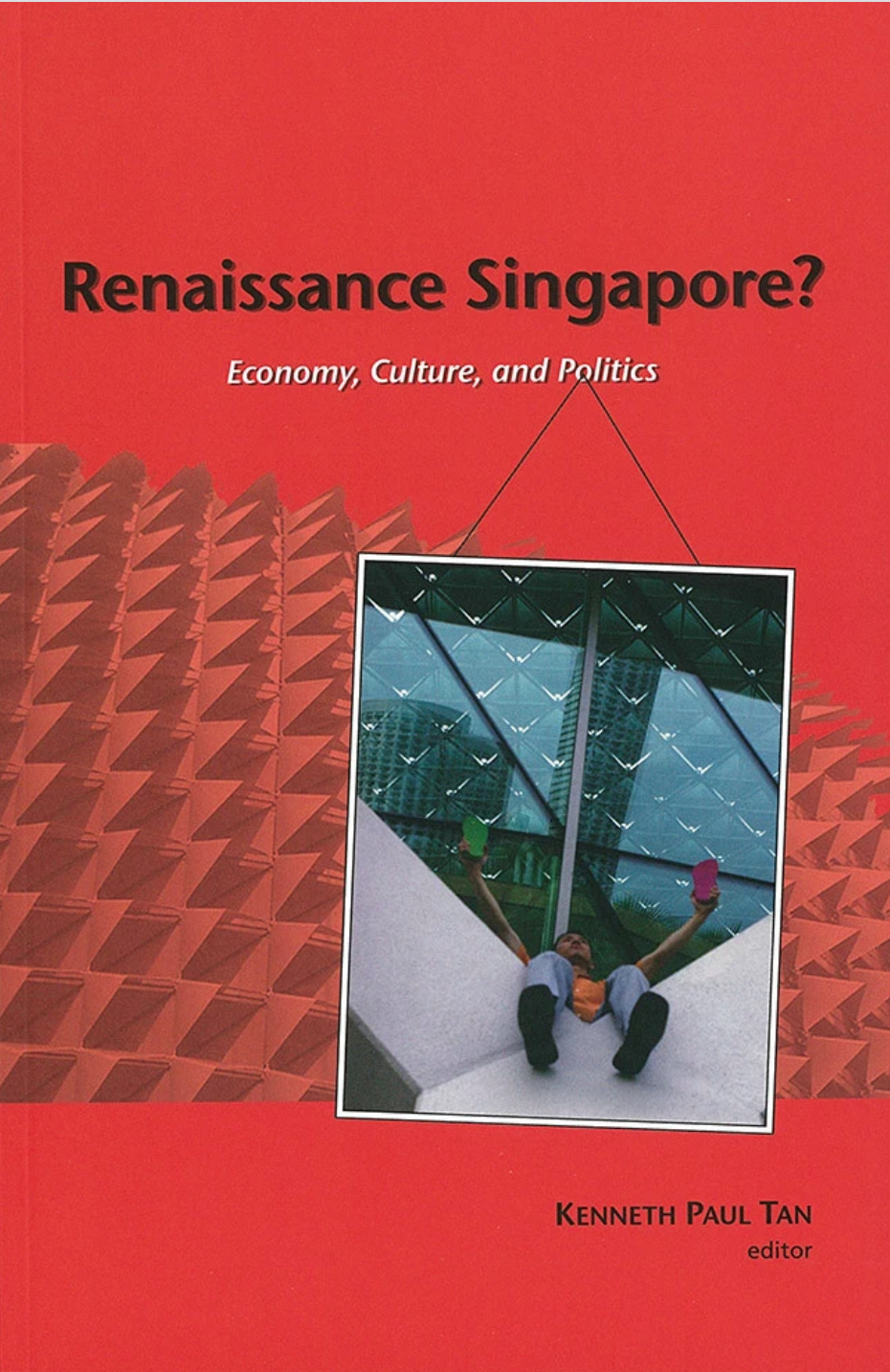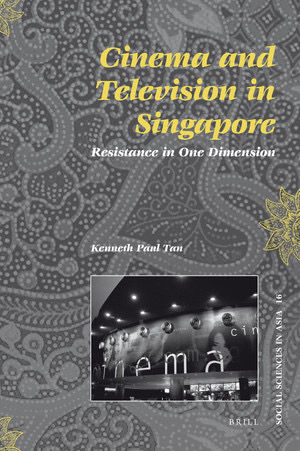Professor of Politics, Film, and Cultural Studies

BOOKS

Kenneth Paul Tan (editor) (2023) Asia in the Old and New Cold Wars: Ideologies, Narratives, and Lived Experiences (Palgrave MacMillan)
This is a collection of essays marking the 30th anniversary of the historic Cold War’s formal conclusion in 1991. It enriches Cold War studies—a field dominated by Political Science, International Relations, and History—with insights from Sociology, Anthropology, Cultural Studies, and Film and Media Studies. Through critical analysis of newspaper and magazine articles, films, novels, art exhibits, museums, and other commemorative sites that engage with the themes of conflict, violence, trauma, displacement, marginalization, ecology, and identity, the book provides rich and diverse perspectives on the complex relationship between the historic Cold War and its legacies on the one hand and, on the other, their impact on Asia, its plural histories and peoples, and their shifting identities, ideological beliefs, and lived experiences.
Today, we often speak of an ‘Asian century’ and witness intensifying concerns over ‘new cold wars’ or ‘Cold War 2.0’. A United Statesin decline and a China on the rise create conditions for a new superpower rivalry, with a trade war already being fought between the two competitors. Russia continues to flex its geopolitical muscles, launching a full-scale invasion of neighbouring Ukraine in 2022, as its strongman leadership yearns nostalgically for the good old days of the USSR. As grand narratives and strategies of the Cold War jostle to make sense of high-level geopolitical events, this book descends to the level of lived experience, zooming in on ordinary and marginalized peoples, whose lives and livelihoods have been affected over the decades by the Cold War and its legacies.
TABLE OF CONTENTS
Interpreting the Cold War and the New Cold War in Asia, Kenneth Paul Tan
Curating Memory: Cold-War Narratives in Museums and Memorials in Taiwan, Vietnam, South Korea, and Cambodia, Giacomo Bagarella
Ecology as a Cold-War Scale: Lau Kek Huat’s Absent Without Leave and Ha Jin’s War Trash, Zhou Hau Liew
Where Is My Homeland? Mainland Chinese Refugees and Hong Kong Tenement Films During the Cold-War Era, Linda Huixian Ou
The Cold-War Structure of Feeling: Revisiting the Discourse of “Dalumei” (Mainland Little Sister) in Taiwan, I-ting Chen
China’s Health Diplomacy in the “New-Cold-War” Era: Contrasting the Battle of Narratives in Europe and the Middle East and North Africa, Emilie Tran, Yahia H. Zoubir
Hungary and the New-Cold-War Narrative on China, Ágota Révész
Haunted History: Exorcising the Cold War, Kenneth Paul Tan

Kenneth Paul Tan (2022) Movies to Save Our World: Imagining Poverty, Inequality and Environmental Destruction in the 21st Century (Penguin)
Through a close analysis of more than seventy popular documentaries and feature movies from around the world, produced in the twenty-first century, this book explores the theme of poverty, inequality, ecological degradation and revolutionary change, all associated with a contemporary crisis of neoliberal globalization in a world where it has become so pervasive. Profit rules, while poverty and inequality make the political ground fertile for populist manipulation. By returning power to the people, healthier forms of populism can lead the way to progressive revolutionary change that enriches democracy and corrects for social injustice. However, through ideological and political manipulation, populism can also take more debased authoritarian forms, promoting conformism, domination, exploitation, marginalization and degradation of humanity and its habitat. The book urges progressive moviemakers to take advantage of advancements in digital technologies and to collaborate, in post-pandemic times, with educators to develop public deliberation skills and inspire a new generation of informed and compassionate change-makers.
TABLE OF CONTENTS
1. What is Wrong with Our World Today?
2. The Populism of Michael Moore, Working-Class Hero
3. Corporate Greed: Health, Education, and Criminal Justice
4. Destroying Our Planet
5. Narrating Poverty, Inequality, and Revolution
6. Capitalist Psychos and Cinematic Zombies
7. Can Movies Really Save Our World?
REVIEWS
"Can movies build registers for bringing about social change amidst the devastating effects of neoliberal globalization and the global rise of authoritarian populism? Professor Kenneth Paul Tan, one of the most significant public intellectuals of Singapore, grapples with this vital question of our times, exploring the ways in which cinema can build our capacities for collective deliberation to build a just and sustainable world. The striking geographic expanse of the book and the brilliant analysis of the questions of poverty, inequality, massive ecological destruction, authoritarian populism and revolution offer conceptual fodder for exploring the ways in which the craft of moviemaking can connect audiences with their moral feelings and intuitions."
Mohan Dutta, Dean’s Chair Professor of Communication at Massey University, and Director of the Center for Culture-Centered Approach to Research and Evaluation (CARE)
"In Movies To Save Our World, Kenneth Paul Tan explores how cinematic texts present poverty, inequality and environmental destruction in today’s global world. Tan engages the films of Michael Moore and other major documentary filmmakers, as well as significant narrative fictional texts, to explore how cinema can help us see the problems, challenges, and inequities of the world, as well as possible solutions. The result is a probing and provocative text that enables us to envision the political possibilities of contemporary cinema."
Douglas Kellner, Distinguished Research Professor of Education, Graduate School of Education and Information Studies, UCLA
"Learning from films is something I always enjoyed, as I love both movies and books. Kenneth combined his immense knowledge in the art of filmmaking (he is the founding chair of the Asian Film Archive) and his profession of political scientist to distill lessons from 80 movies and documentaries for some of the most pressing challenges of our times: poverty, inequality, environment, and social justice. He provides a solid intellectual framework in chapter 1 and then proceeds to critically analyze the documentaries and movies of his choice. Images are very powerful educational tool, because they can connect more easily with our emotions and intuitions in a way that graphs and data cannot. Great read!"
Francesco Mancini, Associate Professor, Lee Kuan Yew School of Public Policy, National University of Singapore.

Kenneth Paul Tan (editor) (2022) Singapore's First Year of COVID-19: Public Health, Immigration, the Neoliberal State, and Authoritarian Populism (Palgrave Macmillan)
This book addresses the question of what Singapore's COVID-19 pandemic response in the first year can tell us about the strengths and weaknesses of the Singapore model and what its prospects might be in an increasingly volatile, uncertain, complex, and ambiguous post-pandemic world. As a concise, holistic, and critical documentation of the first year of COVID-19 in Singapore, the multi-disciplinary chapters in this book provide a broad-ranging analysis of an internationally admired model of governance severely tested by a global pandemic crisis whose end is still not in sight. The book focuses specifically on the interconnections among Singapore’s political economy, public health policies, immigration policies, and the elite and pragmatic system of state authoritarianism that, especially since the 1980s, has been at the heart of managing the tensions and contradictions of a nation-state that is also a global city, an important node in a network of goods, services, investments, wealth, people, ideas, and images, all moving rapidly. The chapters critically employ topics and concepts such as neoliberal globalization, authoritarian populism, moral panic, social stigmatization, heterotopia, spatial segregation, and others to make sense of a thoroughly complex situation.
TABLE OF CONTENTS
Neoliberal Globalization, Authoritarian Populism, and Moral Panics
Kenneth Paul Tan
Neoliberal Singapore: Nation-State and Global City
Andrea Dugo
Public Health Legacies: Tuberculosis, HIV/AIDS, and SARS in Singapore
Hongwu Lyu, Aymeric Vo Quang
Tackling Covid-19, the Singapore Way
Johanna Dirlewanger-Lücke, Junhao Li
The Contradictions and Challenges of Singapore’s Immigration Policy
Davide Brugola, Michael Flood
Migrant Worker Dormitories: Virus in a Neoliberal Politics of Space
Carolin Bernhard, Mara Ellemunt
Ready for the Post-Pandemic World?
Kenneth Paul Tan

陳思賢 (2020) (譯:鄺健銘) 新加坡模式:城邦國家建構簡史 (季風帶文化)Kenneth Paul Tan (2020) (trans. Kwong Kin Ming) Singapore Model: A Brief History of City-State Construction (Monsoon Belt Culture)
*在後李光耀時代,新加坡是風華正茂,還是風華不再?
*作為「全球城市」與「國族國家」,新加坡的雙重身份如何令「新加坡模式」漸現疲態?
*新加坡社會能否壯大,為何是新加坡的未來國家發展重要議題?
「我們並非在安逸環境裡下棋。我們耗時議事之際,週邊世界都在變動。我們其實是在參與足球賽,
只要我們靜止不動,世界其他對手便會將我們撃敗……」
在《新加坡模式—城邦國家建構簡史》之中,新加坡李光耀公共政策學院前副院長陳思賢(Kenneth Paul Tan)認為,論述是建國重要根基。新加坡一黨獨大的威權管治所以能夠延續至今,主要原因是官
方積極宣揚其國家發展論述,並希望藉此取信於民﹑維持政府威信。這套官方論述強調,國家生存基礎 薄弱,與此同時人民行動黨政府秉持實用主義哲學,重視用人唯賢﹑廉潔與誠信,並以長遠目光發展國 家經濟。國家若非由人民行動黨政府以威權方式治國,新加坡便會陷入分裂,難有今天亮麗成就。不過,官方這套國家發展論述已因新加坡擁有雙重身份而愈加受質疑。新加坡既是國族國(nation-state),也是全球城市(global city)。國家扮演雙重角色,令新加坡多種族、多宗教、多語言社會的矛盾 與日俱增。新加坡作為全球城市,需要積極迎合新自由主義式(neo-liberalism)全球化發展。但從新加 坡普羅大眾角度看,在「市場至上」管治方針下,新加坡社會的貧富差距問題日益加劇,政府管治表現 並非毫無瑕疵,「新加坡模式」逐漸失去光環,官方所宣揚的國家發展論述說服力漸失,官民關係更形 疏離,民怨在累積。面對瞬息萬變的全球局勢,於內憂外患之中,被全球大小國家視為發展典範的「新加坡模式」將會如 何延續其榮光?
陳思賢(Kenneth Paul Tan)將從本土民情角度書寫「新加坡模式」原貌,破除「新加坡神話」迷思,分析「新加坡模式」在後李光耀時代面臨的危機。《新加坡模式—城邦國家建構簡史》是立足本土﹑解構「新加 坡模式」成敗得失的必讀入門書。
Read about the book in:

Kenneth Paul Tan (2018) Singapore: Identity, Brand, Power (Cambridge University Press)
Contemporary Singapore is simultaneously a small postcolonial multicultural nation state and a cosmopolitan global city. To manage fundamental contradictions, the state takes the lead in authoring the national narrative. This is partly an internal process of nation building, but it is also achieved through more commercially motivated and outward facing efforts at nation and city branding. Both sets of processes contribute to Singapore's capacity to influence foreign affairs, if only for national self-preservation. For a small state with resource limitations, this is mainly through the exercise of smart power, or the ability to strategically combine soft and hard power resources.
TABLE OF CONTENTS
Singapore's political development through cultural and ideological lenses
Ideological sources of Singapore's hegemonic state
A multiracial, multi-lingual, and multi-religious nation-state
A cosmopolitan global city
Civil society and public engagement
Nation and city branding
The soft power of a small state
The future of the hegemonic state.
REVIEWS
"Reading this book will do much to counter the all-too-ubiquitous, one-dimensional characterizations of Singapore, as it covers a wide range of caricature-busting ground in a mere 75 pages. Nearly all of it is in simple, jargon-free prose appropriate for a general audience or university classroom. Moreover, it largely avoids the pronounced pro- or anti-establishment overtones that mark much of the academic work on Singapore. ... Singapore: Identity, Brand, Power is highly effective as a starting point for understanding Singapore and as a reference for those already familiar with the country."
Kai Ostwald (2019) Book review in Pacific Affairs, 92(4). Full article available here.
"Kenneth Paul Tan draws an up-to-date, insightful, critical and detailed analysis of Singapore’s past achievements, current politics, and implications for the future. The book is an excellent discussion starter for scholars, policymakers, and those who are interested in current Singapore politics and policy implications for other Asian countries such as China."
M. Kerem Coban (2019) Book review in Chinese Public Administration Review, 10(1). Full article available here.
VIDEO



Kenneth Paul Tan (editor) (2007) Renaissance Singapore? Economy, Culture, Politics (NUS Press)
Kenneth Paul Tan (2017) Governing Global-City Singapore: Legacies and Futures After Lee Kuan Yew (Routledge)
Kenneth Paul Tan (2008) Cinema and Television in Singapore: Resistance in One Dimension (Brill)
